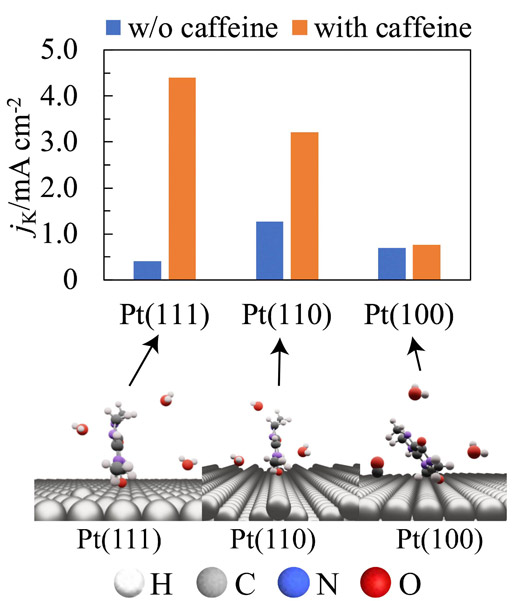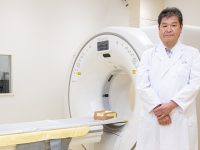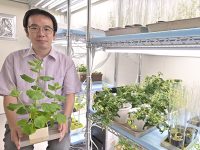Caffeine enhances the efficiency of fuel cells by increasing the activity of the oxygen reduction reaction
Fuel cells, while promising, are expensive due to high catalyst requirements to increase the oxygen reduction reaction (ORR) activity. In a breakthrough, researchers found that adding caffeine to the electrodes can improve the ORR activity of platinum electrodes 11 times. This discovery can enhance the efficiency of the fuel cell, reduce the requirement for excess platinum catalysts, and ultimately lead to cheaper and more efficient fuel cells.

Image title: The effect of caffeine on the oxygen reduction reaction activity of platinum (Pt) electrodes
Image caption: Adsorbed structure of caffeine on well-defined Pt single crystal electrodes and the activity of air electrode of fuel cell before (blue bar) and after (orange bar) caffeine modification.
Image credit: Professor Nagahiro Hoshi from Chiba University
Image license: CC BY
With global goals set on transitioning away from fossil fuels, fuel cells stand out as a promising carbon-free energy source. Comprising an anode and a cathode separated by an electrolyte, fuel cells convert the chemical energy of fuel directly into electricity. The anode receives the fuel, while an oxidant, typically oxygen from the air, is introduced at the cathode. In a hydrogen fuel cell, hydrogen undergoes oxidation at the anode, producing hydrogen ions and electrons. The ions move through the electrolyte to the cathode, and electrons flow through an external circuit, generating electricity. At the cathode, oxygen combines with the hydrogen ions and electrons, resulting in water as the sole byproduct.
However, the presence of water affects the performance of the fuel cell. It reacts with the platinum (Pt) catalyst, forming a layer of platinum hydroxide (PtOH) on the electrode, which obstructs the efficient catalysis of the oxygen reduction reaction (ORR), leading to energy losses. To maintain efficient operation, fuel cells require a high Pt loading, which significantly increases the costs of fuel cells.
Now, in a study published in the journal Communications Chemistry on February 3, 2024, Professor Nagahiro Hoshi, along with Masashi Nakamura, Ryuta Kubo, and Rui Suzuki, all from the Graduate School of Engineering at Chiba University, Japan, have found that adding caffeine to certain platinum electrodes can increase the activity of the ORR. This discovery has the potential to reduce platinum requirements, making fuel cells more affordable and efficient.
“Caffeine, one of the chemicals contained in coffee, enhances the activity of a fuel cell reaction 11-fold on a well-defined Pt electrode of which atomic arrangement has a hexagonal structure,” says Prof. Hoshi.
To assess caffeine’s impact on the ORR, researchers measured current flow through platinum electrodes immersed in an electrolyte containing caffeine. These platinum electrodes had surface atoms arranged in specific directions, namely (111), (110), and (100). There was a notable improvement in the electrode’s ORR activity with an increase in caffeine concentration in the electrolyte. Caffeine, when present, adsorbs onto the electrode’s surface, effectively preventing hydrogen adsorption and the formation of Pt oxide on the electrode.
However, the effect of the caffeine depended on the orientation of the platinum atoms on the electrode’s surface.
At a caffeine molar concentration of 1 × 10−6, the ORR activity on Pt(111) and Pt(110) increased by 11 and 2.5 times, respectively, with no noticeable effect on Pt(100). To understand this difference, the researchers investigated the molecular orientation of caffeine on the electrode surface using Infrared Reflection Absorption Spectroscopy. They found that caffeine gets absorbed on Pt(111) and Pt(110) surfaces with its molecular plane perpendicular to the surface. However, on Pt(100), steric hindrances cause it to be attached with its molecular plane tilted relative to the surface of the electrode.
“The increased ORR activity of Pt(111) and Pt(110) was attributed to the decreased PtOH coverage and lower steric hindrance of the adsorbed caffeine. Conversely, for Pt(100), the effect of decreasing PtOH was counteracted by the steric hindrance of the adsorbed caffeine, and thus caffeine did not affect the ORR activity,” explains Prof. Hoshi.
Unlike batteries with limited lifespans, fuel cells can generate power as long as fuel is supplied, making them suitable for various applications, including vehicles, buildings, and space missions. The proposed method has the potential to improve the designs of fuel cells and lead to their widespread use.
About Professor Nagahiro Hoshi
Nagahiro Hoshi is a Professor at the Department of Applied Chemistry and Biotechnology, Graduate School of Engineering, Chiba University, where he heads the Surface Electrochemistry Laboratory. He has published multiple papers on topics related to surface electrochemistry, surface chemistry, fuel cells, and nanoparticles. He holds a Ph.D. from Kyoto University and is a member of the Chemical Society of Japan, Electrochemical Society of Japan, International Electrochemical Society, The Japan Society of Vacuum and Surface Science, and Japan Society for Molecular Science. At Chiba University, he teaches courses in electrochemistry, quantum chemistry, chemistry basic experiments, graduate school analytical chemistry, surface physical chemistry, as well as a special course on surface electrochemistry.
Funding:
This study was supported by the New Energy and Industrial Technology Development Organization (NEDO) 20001187-0.
Reference:
Title of original paper: Enhanced oxygen reduction reaction on caffeine-modified platinum single-crystal electrodes
Authors: Nagahiro Hoshi1, Masashi Nakamura1, Ryuta Kubo1, and Rui Suzuki1
Affiliations: 1Department of Applied Chemistry and Biotechnology, Faculty of Engineering, Chiba University
Journal: Communications Chemistry
DOI: 10.1038/s42004-024-01113-6
Contact: Nagahiro Hoshi
Professor, Chiba University
Email: hoshi@faculty.chiba-u.jp
Public Relations Office, Chiba University
Address: 1-33 Yayoi, Inage, Chiba 263-8522 JAPAN
Email: koho-press@chiba-u.jp
Tel: +81-43-290-2018
Recommend
-

Uncovering the Pathology of Society: Cross-professional Collaboration to Investigate Cause of Death and Prevent Child Abuse
2023.04.26
-

Creating Cities of Coexistence: Transitional Landscapes with the Tapestry of Diverse Lives
2024.02.09
-

Unfettered thinking, elaborate theorizing, and an accepting and positive attitude: With the precepts of his former supervisors in mind, Dr. Shimada is tackling the global food crisis
2023.01.04


